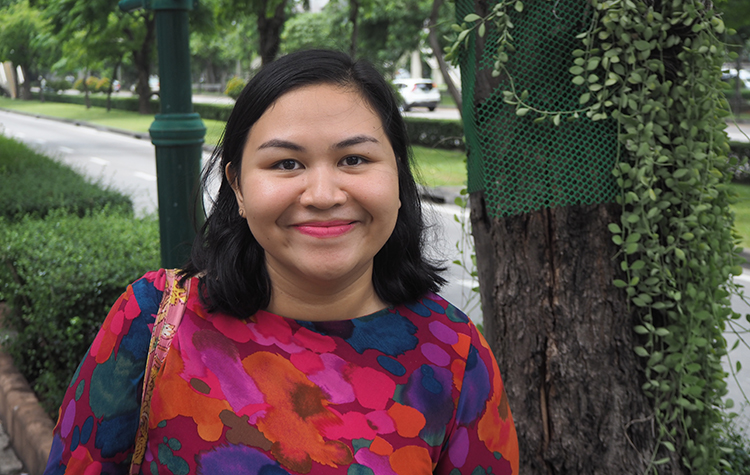For this month e-newsletter, FORUM-ASIA interviewed Rachel Arinii Judhistari, FORUM-ASIA East Asia and ASEAN Advocacy Programme Manager. Rachel started to be involved in human rights when she was 16 years old in Indonesia, and previously worked with the ASEAN Parliamentarians for Human Rights (APHR).
During the interview we asked her about her motivation, inspiring moments and challenges, as well as advice for young people interested in human rights.
How did you get involved with human rights?
I started my activism back when I was in high-school, in my country, Indonesia. I was a peer-educator in an HIV programme, which gave me the opportunity to work and assist people living with HIV. I then volunteered in a youth-led organisation working not only on HIV related issues but also on the broader issue of diversity, advocating for the rights of people with diverse sexual orientation and gender identities.
In 2005, I started to get directly involved with the Indonesian human rights movement, promoting the right to safe and legal abortion in the country. Unfortunately, this is still not a reality, but we keep striving for it.
Do you remember your first interaction with FORUM-ASIA?
Back in 2011, I participated in the ASEAN People’s Forum in Indonesia. In particular, I was involved in the youth forum, which was facilitated by FORUM-ASIA. That is when I came to know about the organisation.
However, my brightest memory of FORUM-ASIA is when I met with the former Executive Director of FORUM-ASIA, Evelyn Balais-Serrano, in Seoul, South Korea, during the Asia Democracy Forum. I remember her highlighting FORUM-ASIA’s commitment to protect and promote democracy in the region.
What motivated you to become involved? And has that motivation changed over the years?
You see that there is injustice everywhere, and we cannot ignore it. We have to do something about it, even though things get worse year after year. In addition to this, the space for civil society is increasingly shrinking.
To be honest, it is getting more difficult to keep the motivation high, because it is very hard to see progress. I also see an internal issue, as the civil society movement is becoming more restraint and competitive. This does not allow us to move forward. However, considering all the challenges we are confronted with, we have to be more strategic in terms of engagement and never forget that we are strong only if we stand together, with our passions and common goals.
What have been inspiring moments for you in your work in the past? And what has been challenging?
In 2011, I worked with a group of women living with HIV in Burma/Myanmar. They bloomed into being fierce, generous and well-grounded activists. I was very impressed that only few years after starting the group, they were able to learn and to get involved with the Burma/Myanmar processes on the Convention on the Elimination of all Forms of Discrimination Against Women (CEDAW). They also used CEDAW advocacy as a strategy to mobilise the grass-root community. Through that experience, I became inspired by how collaboration between regional and local/ national organisation can work.
In terms of challenging moments, generally speaking dealing with the ASEAN infrastructure is not an easy job. There is no clear decision-making process, and this has been, and it remains a major challenge. However, we are doing our best to counter the non-interference mechanism and still manage to speak out. It is imperative for us to knock on the governments’ doors and demand them to be accountable.
What do you experience as the main challenges as someone working on human rights? And how do you deal with such obstacles in your work?
Self-care is definitely a challenge that we face as human rights activists. I started my activism when I was 16 years old and from that moment on, I see myself struggling to prioritise my physical and mental health. I see my colleagues struggling in this sense, and on top of that, being also intimidated because of the work they are doing.
Human rights organisatons should put more resources and efforts on self-care. For this, it is important to also educate donors on the importance of self-care, in order to ensure the availability of resources.
Another challenge is that our movement has been fuelled by the donors. Of course, this is necessary as we need resources. However, this also creates competition among organisations, pushing us to work in silos. So rather than achieving one common goal for the greater good, we tend to live in our own cubicles and look at small personal successes.
To counter this, we need to strengthen our work at the community-level, expanding our contacts also to new groups, especially if led by youth or sexual minorities. The human rights arena is broad, and we should always be ready to invite other people to come in, sharing knowledge and expertise with each other.
If you could give a message to the new generation of people working on human rights or development, what would it be?
Everyone is a human rights defender at heart. So if you want to get involved in human rights, do not be afraid to do so, do not be afraid to be judged, of the discourse and terminology. Be informed, reach out to the human rights groups and do whatever you can to help.



